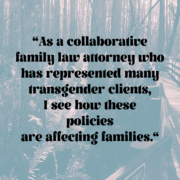Tampa Bay Times Column on Transgender Name Changes
Tampa Bay Times Columnist Sue Carlton writes in the September 26, 2016 edition of the newspaper about a growing trend in Florida Family Law Courts: Petitions for Change of Legal Name by transgender individuals.

In Florida, courts grant requests for changes of name relatively freely. So long as a person has not been convicted of a felony (or, if they have been convicted of a felony, then they must have had their civil rights restored), and that the person is not seeking the name change for an illegal or ulterior purpose (such as to avoid a debt or lawsuit), the court will generally grant your request for a name change.
However, you must take the required steps for a name change, including properly filing a petition, going through a background check by the Florida Department of Law Enforcement and Federal Bureau of Investigation, and appearing before a judge for questioning.
The fact that a person is changing a name from one that is associated with one gender to a name that is associated with a different gender should not make a difference.
Parts of the Tampa Bay Times article, A new frontier for Florida courts: Transgender name changes, can be found after the jump:
The petitioner stands, starting to sweat. He wonders if the judge will be judgmental. He has had some experience with judgmental.
Hillsborough Circuit Judge Tracy Sheehan waves him up close to the bench, looks into his file, asks a few questions.
“And you are currently Christine Rose?” she says.
Yes.
“And you wish to change your name to Christopher Skye?”
“Yes ma’am,” says Novak, 27.
By now the restless audience has stilled to listen. “He’s a girl?” a woman whispers to her friend.
No criminal record, the judge notes, and nothing to indicate you’re doing this to duck a debt. She looks at a driver’s license photo that could be his pretty sister. Then she peers over her glasses at him.
She says she is glad to be part of this moment. “You look every bit Christopher,” she says. Papers are signed, dated, stamped. “You are now a young man, officially on paper,” the judge says. The whole thing takes only a few minutes.
He walks out of court with his girlfriend. The rain has stopped. Legally, he is who he feels like he has been for a long time. He has a name that sounds like himself. He is, officially, Christopher.
***
Often, name change requests are about restoring former names after divorces or making sure the name someone has been using matches the one on his birth certificate. But at this moment in history — when even small- town America knows Bruce Jenner became Caitlyn and the president himself has weighed in on bathrooms in schools — judges are seeing more of another kind of name change on their dockets: Transgender people who want their names to reflect not the sex to which they were born, but the one with which they identify.
***
Advocates say a legal name change can be an important psychological, social and emotional step — particularly given a transgender population in which a stunning 41 percent report having attempted suicide. It’s a population that also reports high rates of discrimination and harassment.
A name that matches your gender identity — and how you look, dress and present yourself — is “a very simple way that the world validates you as who you are,” say Mira Krishnan, a Michigan neuropsychologist and diversity consultant who has worked on LGBT issues. “It has a sense of feeling right.”
“It’s funny — people will say to me, ‘I forgot what your name was before,’ ” says Krishnan, who legally changed her name two years ago. “I do, too.”
Some won’t speak their former name. It’s called “dead-naming” when someone else insists on using it.
“When I use my birth name, it’s kind of like lying,” says JJ Martinez, a 27-year-old Tampa college student who came out as a transgender man at 19. “Pretending to be somebody I’ve really never been.”
Novak, the Plant City petitioner who hopes to become a chef, says a new name is like saying goodbye and then welcoming who you are.
“Your happier self,” he says.
Transgender activists say that carrying around a name that doesn’t match how a person looks can even be dangerous. It can attract the kind of attention “that can lead to harassment, abuse, even violence,” says Littrell of Lambda Legal.
According to the National Transgender Discrimination Survey, 40 percent of respondents reported being harassed when they used an ID that did not match their gender expression. Fifteen percent were asked to leave an establishment. Three percent said they were assaulted or attacked.
“It’s not like you wake up one day and say, ‘Oh, this is who I can be,’ ” Martinez says. “Nobody would choose to do something that could get them killed.”
Judges say they see the weight of this in court.
“I’ve heard from enough transgender folks who tell me the day they get their name change — something which they celebrate like you and I might celebrate a birthday — they view this as almost like a rebirth for them,” says Judge Bernstein.
“I sense some relief,” says Judge Scionti.
“Sometimes,” says Judge Helinger, “it is truly moving on to another chapter of life.”
If you have questions regarding legal name changes or other LGBT family law issues, schedule a consultation with Family Diplomacy: A Collaborative Law Firm at (813) 443-0615 or CLICK HERE to fill out our contact form.
Adam B. Cordover has been on the cutting edge of LGBT family law rights in Tampa Bay. He was a collaborative and appellate attorney on Shaw v. Shaw, the first same-sex dissolution of marriage matter in the state to challenge Florida’s so-called Defense of Marriage Act and constitutional amendment banning recognition of same-sex marriages. He has also helped dozens of clients to change their legal name.


 Family Diplomacy
Family Diplomacy
Leave a Reply
Want to join the discussion?Feel free to contribute!